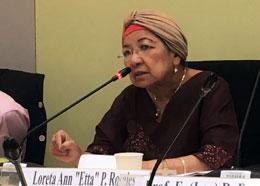“He has fascist dreams”

Filipino rights advocates and survivors of the Marcos-era regime have criticized President Rodrigo Duterte for saying that he could impose martial law to curb what he has called a runaway drug problem.
“I fled my homeland because of Marcos…now Duterte wants to be a dictator like him,” said Gabriel Rosales, who moved to Vancouver from his homeland about 30 years ago.
“There were hundreds of thousands of people like me whose rights were abused and many left the Philippines.
“If there is another dictatorship, more will leave and Philippines will never be the same again,” said the businessman and father of four children.
Duterte the 71-year-old former state prosecutor said the aim of his martial rule would be "to preserve the Filipino people and the youth of this land”.
He says he is acting to prevent the country from becoming a narco-state.
“If I wanted to, and it will deteriorate into something really very virulent, I will declare martial law if I wanted to. No one will be able to stop me,” Duterte said in a speech to businesspeople in the southern city of Davao last weekend.
“My country transcends everything else, even the limitations,” he added.
About 6,000 people have been killed in six months under Duterte's anti-drugs crackdown.
About 2,200 of those happened in encounters with the police, according to the Philippine National Police. The rest are classified as “deaths under investigation,” including those carried out by unknown vigilantes. More than a million people suspected of being drug users or dealers have also surrendered or been arrested.
“He has fascist dreams,” Loretta Rosales, 77, a former chairwoman of the Commission on Human Rights of the Philippines and a leftist politician, said of Duterte in an interview with the New York Times.
She was detained and tortured under Marcos, who was elected president in 1965 and imposed martial law from 1972 to 1981. He was forced from power in 1986.
“As a martial law victim and survivor, I detest his martial law threat,” Rosales said, referring to Duterte’s warning. She added that he “finds governance under the rule of law and human rights an obstruction to the advancement of his political agenda.”
“This is clearly meant to establish authoritarian rule to enforce his goals of cleaning society of drugs, crime and corruption, and he is happy to slaughter three million Filipinos to do this,” she said. She was alluding to Duterte’s statement in September comparing his antidrug campaign to the Holocaust, when he said that he would kill drug addicts by the millions, as Hitler killed Jews.
“I suspect he idolizes the dictator Ferdinand Marcos and this manifests in his behavior,” Rosales said of Duterte.
Duterte has hinted at declaring Martial Law before, then pulled back amid opposition, both from his critics and his allies.
But Duterte said last weekend that if there were a coup d’etat, he would allow it and swear the generals into office and let them bring order to the land.
“Congress may have to impeach me, fine. But, let it not be said that I allowed this country [to be] placed in jeopardy, in peril because I did not know what I had to do,” he said.
Duterte has reacted furiously to the international and local criticism and vowed to continue his war until illegal drugs are eradicated.
The recent comments were Duterte’s most direct threat to impose martial law, which would allow him to use the military to enforce civilian law and detain people at length without charging them.
The country last endured martial law during the 20-year rule of the dictator Marcos, who was accused of plundering billions of dollars from state coffers and overseeing widespread human rights abuses.
Marcos declared Martial Law in 1972, invoking the threats of crime and a communist insurgency, and lifted it in 1981.
His rule ended in 1986, when millions took to the streets in the largely bloodless military-backed “People Power” revolt. A new Constitution was drawn up in 1987 to avoid another dictatorship, saying that the President can impose martial rule for just 60 days, and only to stop an invasion or a rebellion.
Congress can revoke the measure within 48 hours while the Supreme Court can review its legality.
But Duterte, speaking to local businessmen in Davao City, warned he could ignore the 60-day limit.
“The 60-day [limit] will be gone,” he said.
“I will declare Martial Law to preserve my nation, period. I don’t care about the Supreme Court,” he added.
The leftist Bagong Alyansang Makabayan this week warned Duterte not to override the Constitution.
“We warn President Duterte that threats of martial law, along with attempts to override constitutional safeguards, will be met with resistance and will ultimately be defeated by the people. A declaration of martial law, even in the context of what the President describes as a virulent situation, will not save the nation and the people. Removing constitutional checks and balances will open the floodgates to more violations and to blatant authoritarianism. These abuses will doom rather than save the nation,” said Renato Reyes Jr., the group’s secretary general.
Reyes said if they go by the abuses already taking place in the war on drugs, expect these to multiply a hundred fold once Martial Law is declared.
Reyes said Duterte should cease making threats or remarks on Martial Law and instead address the growing concern and indignation over the deaths arising from this war on drugs.
These gross violations provide the strongest arguments against any return to Martial Law, he said.






